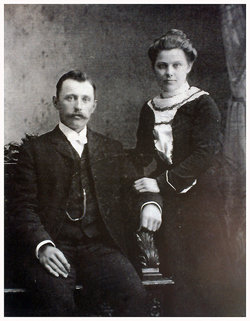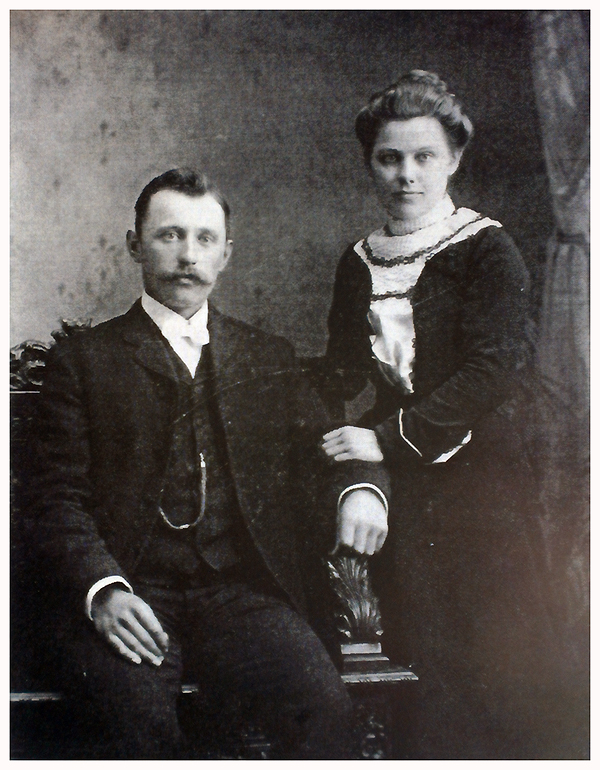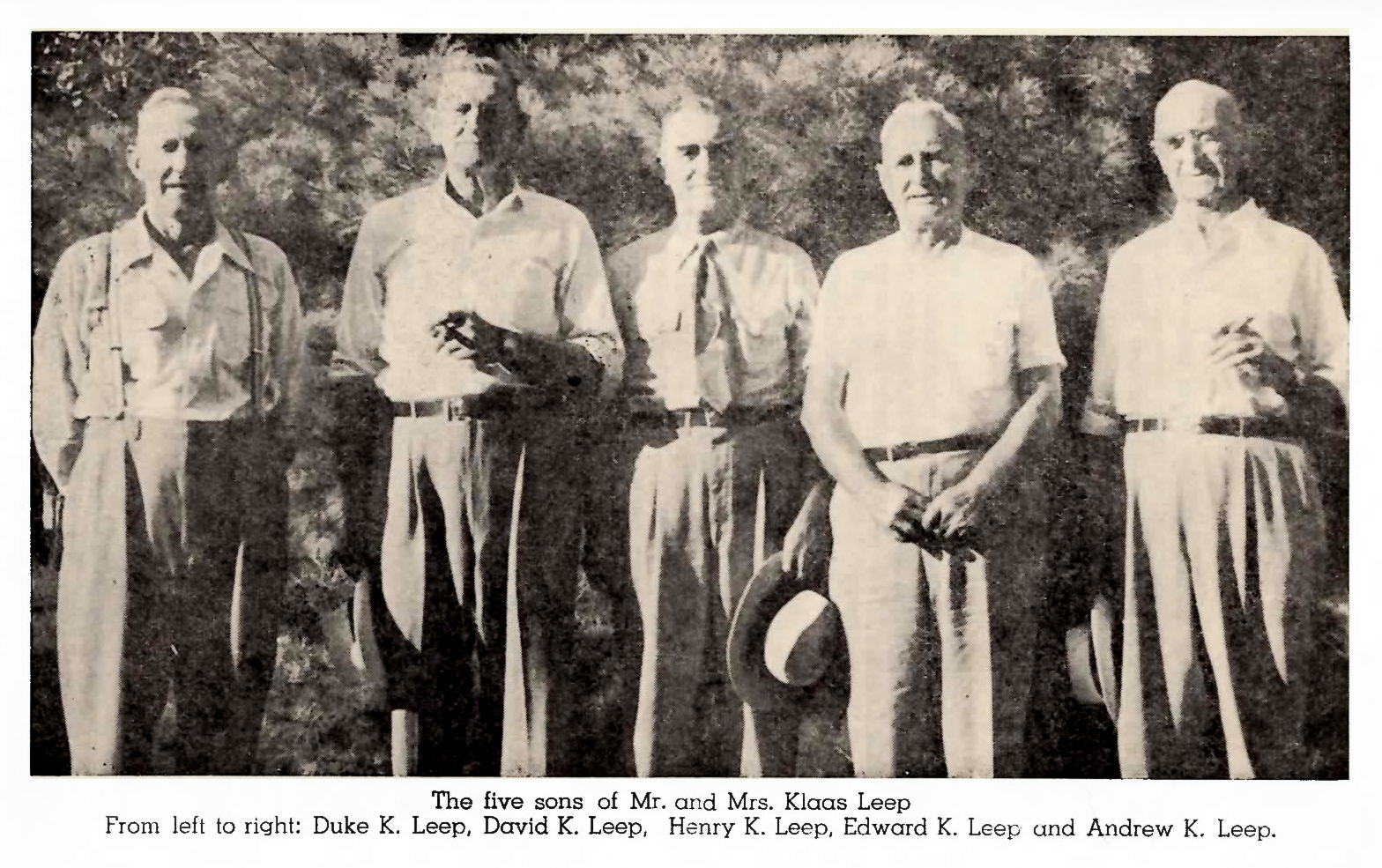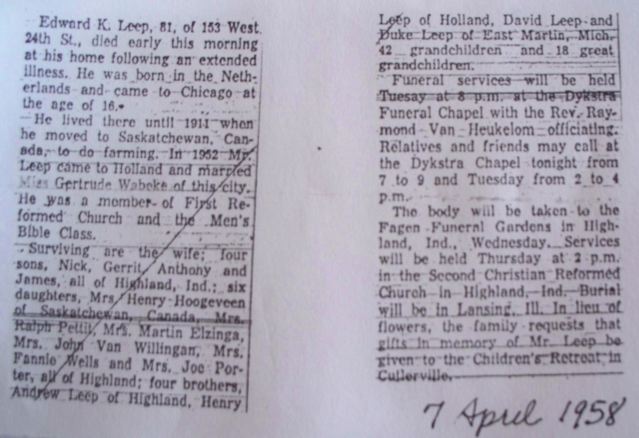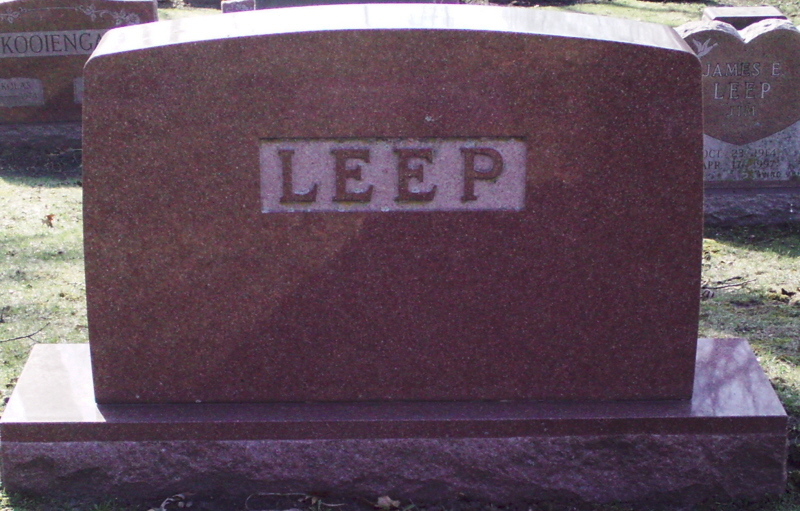On May 19, 1893, the two oldest brothers Andrew (18 years old) and Edward (16) left home, house nr. 170 in Sint Annaparochie, bound for Rotterdam, where they were to embark on May 20. The train ride from Leeuwarden to Rotterdam was quite an experience in itself, as they never before rode in a train. Upon arrival in Rotterdam they were taken to a large hall, belonging to the Holland American Line where they spent the night, embarking on Saturday morning May 20, 1893. On May 31, 1893 laborers Anne and Bertus Leep arrived on the S.S. Maasdam at the port of New york, Ellis Island. Their destination was Chicago, to which they travelled by train.
Former neighbors, who emigrated in 1890 to the USA, had arranged with two grocers to advance the funds for the two brothers to come to America.
Soon after arrival the brothers were hired to weed onions at one dollar a day. Roseland at that time was quite a gardening center, founded by Dutch truck farmers, raising vegetables for the Chicago Market, so that employment in that field was readily found. In Holland Sint Annaparochie was situated in a rural area, so this sort of work was familiar to them. In the fall of the year however, garden activity slackened and before long they found out of employment. In the year 1893 the World's Columbian Exposition was held in Chicago, creating considerable employment during its operations. Next Edward worked for a gardener to market his garden produce in Chicago. Now they were soon able to pay their board bill and passage tickets and save sufficient money to enable the rest of our family to join them in America.
On August 15, 1896 his parents, carpenter Klaas Leep (47) and Klaaske (46), and siblings Haring (16), Janke (13), Hendrik (11), Douwe (9) and Doeke (7) arrived at New York. Their destination was Kensington, a district and train station in the southern part of Chicago. Because their father was criple the two brothers constituted quite a large family. In 1897 they got the chance to rent a garden on shares. The owner was to furnish land and equipment and the brothers to furnish the labor. Edward's brother Andrew married in the fall of 1899 and it was decided that Andrew would stay on the place and that the family would move to a nearby house and that Edward should engage in the buying and selling of garden produce instead of raising it.
In June 1900 Edward Leep (24) resided with his parents and five siblings at 10611 Center Avenue in Calumet Township, Ward 31, south Chicago, Cook County, Illinois. The Italian or Polish census taker heard apparently wrongly Oscar instead of Egbert or Edward, because he is registrated at that occasion with that name. Or was it a practical joke of the brothers Edward and Andrew, because the latter was called in the census 1910 Oscar too?
On May 8, 1902 Egbertus Leep married in Chicago at the age of 25 years the two years younger Jennie Devries, who was born in the Dutch northeastern province Groningen.
They had the following six children in Chicago:
* Nicholas Leep, born 23 Juli 1903;
* Agnes (Anna) Leep, 20 May 1904;
* Gerrit (Gerald, Garrett) Leep, 20 October 1905;
* Clara Leep, 14 January 1907;
* Anthony (Anton) Leep, 10 April 1908;
* Grace Leep, 21 October 1909.
In April 1910 the family lived on a farm in Chicago, Ward 32. Edward was then, like in 1904, a gardener.
In July 1910 his father Nicholas, a gardener too, died at the age of 61 years at 10124 Halsted Street, Ward 33, south Chicago.
Early in the 20th century the Canadian Government carried on an extensive advertising program on the possibilities for settlers in the Canadian West. The cost of a homestead of 160 acres was just a fee of $10.00 with certain cultivation obligations for 3 years, upon completion of which, patent was issued. An additional 160 acres, adjoining the homestead could be had for $3.00 per acre with 5 years of cultivation. In May 1910 Edward and Andrew looked around Swift Current in the southwestern part of the Canadian south central province Saskatchewan for a suitable tract of land of sufficient size to accommodate a settlement of community size and each filed on a piece of land about 8 miles northwest of Swift Current as only $10.00 was involved and they had six months before they would have to occupy the land. In March 1911 the brothers Leep went there firstly to build houses, barns and start cultivating the land. Their wifes and children followed later on in that year. A post office had been established four miles from their place where mail was delivered once a week. Very probably is meant the postoffice of the tiny Dutch community of Cramersburg, located in the southwestern part of the south central Canadian province Saskatchewan, five miles south of the river with the same name and about 12 miles north of Abbey. See for much more info and photos of Cramersburg and the Leeps: http://www.calvin.edu/hh/origins/Spring89.pdf In the meantime, with the rapid development of the country, the RAil Road Company had started a branch line in their direction, running from Swift Current to Empress in Alberta. By the end of the season they had laid the steel up to the town of Cabri, which was about 30 miles from their place. So henceforth they would not have to go to Swift Current anymore. Cabri became a very busy place where every kind of business was established. Ten grain elevators were built there, also a bank, hotel, farm implements, general stores, etc. Moreover the following spring the R.R. construction was resumed, finally only leaving them 10 miles from town. Those towns were laid out by the R.R. and were built before the steel had been laid there. They built their little church and a parsonage in Cramersburg. After its abondoning in 1923 these buildings were transferred to Cabri and are today still historic landmarks. Immediately after the Leep families came to Canada a school district was organized and a new school was built. Edward was elected secretary treasurer of the organization, and filled the office till he left Canada.
A local branch of the Saskatchewan Grain Growers Association was formed of which Edward was elected president. He was delegated to appeal to the Provincial Government at Regina in behalf of the drought stricken farmers. After meeting with the cabinet they obtained gratifying results. In addition to these functions, he was a member of the council.
All this gave Edward a small measure of local popularity, so that when a Dominion election for members of Parliament was to be held, the people of his locality wanted him to run for that office. So his name was submitted with that of several other candidates. But he had no organization and never asked any man to support him or to vote for him. Neither did he do any campaigning. The territory of the Maple Creek district covered about 10,000 square miles and the great majority of the delegates had never heard of him. At the convention at Shaunavon each candidate was allowed to address the convention for fifteen minutes. After the votes were counted Edward proved to be second on the list from the top. The Scotchman Neil McTaggart from Maple Creek got the nomination. Edward was in no way sorry over the outcome whereas crop failures continued, and their little congregation would be dispersed, Edward's family alone would have remained and he would have to spend six months of each year in Ottawa, the capital of Canada.
Edward served also for a number of years as member of the Municipal Council. The council convened once a month in the town of Abby, a distance of 11 miles from home.
Five children were born to Edward in Canada, without benefit of doctor or midwife, including a set of twins, making a total of 11 children.
In March 1923 E.K. Leep and his family had to leave Cramersburg in Canada after 12 years because of animal diseases, coldness, drought, dust bowls and successive crop failures. The family of Edward's brother Andrew left Canada already in 1921 for Sheperd in Montana. From Canada they returned to Chicago, hoping to find an opening somewhere, to again start in the gardening business. A brother-in-law, living near Highland, Lake County, in the extreme northwestern part of Indiana, adjacent to Chicago in Illinois, told them about a farm of 160 acres there, which might be available as the occupant thereof had died. The place was in a rundown condition, but after contacting the owner, they rented the place to be occupied within 10 days, being about April 10, 1923. They bought six horses,the necessary implements and a truck. Whereas the sons had grown up in Canada, this gardening business was foreign to them but they became accustomed to it before too long. The first year was no phenomenal success. This however was no disappointment as they had a late start and impoverished land. After applying carloads of manure and fertilizers this condition was soon corrected. A modest measure of success attended their labors. After theirr dustbowl experiences in Canada, that was gratifying.
In September 1924 sorrow enshrouded them by the death of their wife and mother Jennie. In 1917, as she had a kidney disease, they had gone from Canada to Chicago, as surgery seemed necessary. An operation was there performed and a kidney removed. After her recovery she felt better than she had ever done before, and we were happy. Now however her only kidney had become congested and, failing to function, uremic poisoning set in resulting in her death at the age of 45 years. There were still nine children at home, the oldest girl being seventeen years. It was a period of difficulty. Edward's mother Clara who was now 75 years was staying with David and Duke in Michigan. When Edward was left with the family, she stepped right in there and took charge. When Andrew's wife had died in 1916, she had moved in there and now again with his family.
Mrs. Clark from whom they rented the land wished Edward to take charge of the leashing and collecting rentals of her several farms.
In the mid 1920s E.K. Leep moved like several other families his membership of the Christian Reformed Church in Highland to the CRC of Lansing because the sermons and catechism classes were conducted there in the English language instead of the native Dutch.
During his sojourn in Highland, Edward has been president of young men's societies for eight years and of men's society for three years.
In October 1929 the stock market crashed, paralyzing business and industry. In the years following the crash, the gardening business shared in general slump.
In April 1930 Eward Leep (53 years old, born in Holland, immigrated in 1893, truck farmer), his children Garrett (24, Illinois, truck farm laborer), Antony (21, Illinois, truck farm laborer), Jane (18, Canada), Fannie (16, Canada), James (15, Canada), Sarah (13, Canada) and his mother Clara Leep (80, Holland) were living on a rented farm in Highland, North Township, Lake County, located in the extreme northwestern part of Indiana. In Highland came quite some Dutch settlers after the construction of a railroad. His daughter Clara E. Leep (23) stayed then with 49 other lodgers at the home of the 60 years old Dutch matron Lina Becker in Chicago. His daughter Grace Leep (20) was then a maid for the 65+ Ibach couple in Munster, Lake County, Indiana.
In 1935 Edward was offered the position of greens keeper on The Wicker Park golf course and whereas some of the children were getting married, he accepted this position. A house in the park was included, so he turned the garden business over to the sons who were still at home.
In the winter of 1935/1936 Edward remarried after being a widower for eleven years at the age of about 60 years the two years older Margie Van Wyck, born in 1874 in the Netherlands too, daughter of Anthony and Fannie Van Wyck. She emigrated in 1882 to the USA. She lived in 1910, 1924 and in 1930 as single in Chicago. This became the most bitter experience of Edward's life, it became became unbearable to him and in 1941 the court granted him a legal separation (not a divorce), directing his wife Margie to leave him alone and not to trouble him in anyway.
In May 1940 Edward Leep (63, greens keeper in a public park) lived with his mother Clara (90) at a rented home at 30B Ridge Road in Highland, Lake County, Indiana. A few houses further on the same road his son Nickolas with his family was living at their own home. Edward and his mother lived in 1935 in the same house.
In order to get away from his second wife as far as possible, he gave up his position, which he had held for seven years, and at the invitation of his son Bud and his wife, he went about 1942 to live with them on their farm at Lowell, Indiana.
In 1952 Edward moved to the Dutch settlement and city of Holland, located in the western part of Michigan, and remarried, for the second time, in that year Gertrude Wabeke of Holland, a daughter of Jacob Wabeke and Hubertha Slagh.
Edward K. Leep died in 1958 at his home in Holland, Michigan at the age of 81 years, following an extended illness. His third wife Gertrude died in 1982 at the age of 93 years and was buried in Holland, Michigan, where she resided in 1940 as a single manager.
On May 19, 1893, the two oldest brothers Andrew (18 years old) and Edward (16) left home, house nr. 170 in Sint Annaparochie, bound for Rotterdam, where they were to embark on May 20. The train ride from Leeuwarden to Rotterdam was quite an experience in itself, as they never before rode in a train. Upon arrival in Rotterdam they were taken to a large hall, belonging to the Holland American Line where they spent the night, embarking on Saturday morning May 20, 1893. On May 31, 1893 laborers Anne and Bertus Leep arrived on the S.S. Maasdam at the port of New york, Ellis Island. Their destination was Chicago, to which they travelled by train.
Former neighbors, who emigrated in 1890 to the USA, had arranged with two grocers to advance the funds for the two brothers to come to America.
Soon after arrival the brothers were hired to weed onions at one dollar a day. Roseland at that time was quite a gardening center, founded by Dutch truck farmers, raising vegetables for the Chicago Market, so that employment in that field was readily found. In Holland Sint Annaparochie was situated in a rural area, so this sort of work was familiar to them. In the fall of the year however, garden activity slackened and before long they found out of employment. In the year 1893 the World's Columbian Exposition was held in Chicago, creating considerable employment during its operations. Next Edward worked for a gardener to market his garden produce in Chicago. Now they were soon able to pay their board bill and passage tickets and save sufficient money to enable the rest of our family to join them in America.
On August 15, 1896 his parents, carpenter Klaas Leep (47) and Klaaske (46), and siblings Haring (16), Janke (13), Hendrik (11), Douwe (9) and Doeke (7) arrived at New York. Their destination was Kensington, a district and train station in the southern part of Chicago. Because their father was criple the two brothers constituted quite a large family. In 1897 they got the chance to rent a garden on shares. The owner was to furnish land and equipment and the brothers to furnish the labor. Edward's brother Andrew married in the fall of 1899 and it was decided that Andrew would stay on the place and that the family would move to a nearby house and that Edward should engage in the buying and selling of garden produce instead of raising it.
In June 1900 Edward Leep (24) resided with his parents and five siblings at 10611 Center Avenue in Calumet Township, Ward 31, south Chicago, Cook County, Illinois. The Italian or Polish census taker heard apparently wrongly Oscar instead of Egbert or Edward, because he is registrated at that occasion with that name. Or was it a practical joke of the brothers Edward and Andrew, because the latter was called in the census 1910 Oscar too?
On May 8, 1902 Egbertus Leep married in Chicago at the age of 25 years the two years younger Jennie Devries, who was born in the Dutch northeastern province Groningen.
They had the following six children in Chicago:
* Nicholas Leep, born 23 Juli 1903;
* Agnes (Anna) Leep, 20 May 1904;
* Gerrit (Gerald, Garrett) Leep, 20 October 1905;
* Clara Leep, 14 January 1907;
* Anthony (Anton) Leep, 10 April 1908;
* Grace Leep, 21 October 1909.
In April 1910 the family lived on a farm in Chicago, Ward 32. Edward was then, like in 1904, a gardener.
In July 1910 his father Nicholas, a gardener too, died at the age of 61 years at 10124 Halsted Street, Ward 33, south Chicago.
Early in the 20th century the Canadian Government carried on an extensive advertising program on the possibilities for settlers in the Canadian West. The cost of a homestead of 160 acres was just a fee of $10.00 with certain cultivation obligations for 3 years, upon completion of which, patent was issued. An additional 160 acres, adjoining the homestead could be had for $3.00 per acre with 5 years of cultivation. In May 1910 Edward and Andrew looked around Swift Current in the southwestern part of the Canadian south central province Saskatchewan for a suitable tract of land of sufficient size to accommodate a settlement of community size and each filed on a piece of land about 8 miles northwest of Swift Current as only $10.00 was involved and they had six months before they would have to occupy the land. In March 1911 the brothers Leep went there firstly to build houses, barns and start cultivating the land. Their wifes and children followed later on in that year. A post office had been established four miles from their place where mail was delivered once a week. Very probably is meant the postoffice of the tiny Dutch community of Cramersburg, located in the southwestern part of the south central Canadian province Saskatchewan, five miles south of the river with the same name and about 12 miles north of Abbey. See for much more info and photos of Cramersburg and the Leeps: http://www.calvin.edu/hh/origins/Spring89.pdf In the meantime, with the rapid development of the country, the RAil Road Company had started a branch line in their direction, running from Swift Current to Empress in Alberta. By the end of the season they had laid the steel up to the town of Cabri, which was about 30 miles from their place. So henceforth they would not have to go to Swift Current anymore. Cabri became a very busy place where every kind of business was established. Ten grain elevators were built there, also a bank, hotel, farm implements, general stores, etc. Moreover the following spring the R.R. construction was resumed, finally only leaving them 10 miles from town. Those towns were laid out by the R.R. and were built before the steel had been laid there. They built their little church and a parsonage in Cramersburg. After its abondoning in 1923 these buildings were transferred to Cabri and are today still historic landmarks. Immediately after the Leep families came to Canada a school district was organized and a new school was built. Edward was elected secretary treasurer of the organization, and filled the office till he left Canada.
A local branch of the Saskatchewan Grain Growers Association was formed of which Edward was elected president. He was delegated to appeal to the Provincial Government at Regina in behalf of the drought stricken farmers. After meeting with the cabinet they obtained gratifying results. In addition to these functions, he was a member of the council.
All this gave Edward a small measure of local popularity, so that when a Dominion election for members of Parliament was to be held, the people of his locality wanted him to run for that office. So his name was submitted with that of several other candidates. But he had no organization and never asked any man to support him or to vote for him. Neither did he do any campaigning. The territory of the Maple Creek district covered about 10,000 square miles and the great majority of the delegates had never heard of him. At the convention at Shaunavon each candidate was allowed to address the convention for fifteen minutes. After the votes were counted Edward proved to be second on the list from the top. The Scotchman Neil McTaggart from Maple Creek got the nomination. Edward was in no way sorry over the outcome whereas crop failures continued, and their little congregation would be dispersed, Edward's family alone would have remained and he would have to spend six months of each year in Ottawa, the capital of Canada.
Edward served also for a number of years as member of the Municipal Council. The council convened once a month in the town of Abby, a distance of 11 miles from home.
Five children were born to Edward in Canada, without benefit of doctor or midwife, including a set of twins, making a total of 11 children.
In March 1923 E.K. Leep and his family had to leave Cramersburg in Canada after 12 years because of animal diseases, coldness, drought, dust bowls and successive crop failures. The family of Edward's brother Andrew left Canada already in 1921 for Sheperd in Montana. From Canada they returned to Chicago, hoping to find an opening somewhere, to again start in the gardening business. A brother-in-law, living near Highland, Lake County, in the extreme northwestern part of Indiana, adjacent to Chicago in Illinois, told them about a farm of 160 acres there, which might be available as the occupant thereof had died. The place was in a rundown condition, but after contacting the owner, they rented the place to be occupied within 10 days, being about April 10, 1923. They bought six horses,the necessary implements and a truck. Whereas the sons had grown up in Canada, this gardening business was foreign to them but they became accustomed to it before too long. The first year was no phenomenal success. This however was no disappointment as they had a late start and impoverished land. After applying carloads of manure and fertilizers this condition was soon corrected. A modest measure of success attended their labors. After theirr dustbowl experiences in Canada, that was gratifying.
In September 1924 sorrow enshrouded them by the death of their wife and mother Jennie. In 1917, as she had a kidney disease, they had gone from Canada to Chicago, as surgery seemed necessary. An operation was there performed and a kidney removed. After her recovery she felt better than she had ever done before, and we were happy. Now however her only kidney had become congested and, failing to function, uremic poisoning set in resulting in her death at the age of 45 years. There were still nine children at home, the oldest girl being seventeen years. It was a period of difficulty. Edward's mother Clara who was now 75 years was staying with David and Duke in Michigan. When Edward was left with the family, she stepped right in there and took charge. When Andrew's wife had died in 1916, she had moved in there and now again with his family.
Mrs. Clark from whom they rented the land wished Edward to take charge of the leashing and collecting rentals of her several farms.
In the mid 1920s E.K. Leep moved like several other families his membership of the Christian Reformed Church in Highland to the CRC of Lansing because the sermons and catechism classes were conducted there in the English language instead of the native Dutch.
During his sojourn in Highland, Edward has been president of young men's societies for eight years and of men's society for three years.
In October 1929 the stock market crashed, paralyzing business and industry. In the years following the crash, the gardening business shared in general slump.
In April 1930 Eward Leep (53 years old, born in Holland, immigrated in 1893, truck farmer), his children Garrett (24, Illinois, truck farm laborer), Antony (21, Illinois, truck farm laborer), Jane (18, Canada), Fannie (16, Canada), James (15, Canada), Sarah (13, Canada) and his mother Clara Leep (80, Holland) were living on a rented farm in Highland, North Township, Lake County, located in the extreme northwestern part of Indiana. In Highland came quite some Dutch settlers after the construction of a railroad. His daughter Clara E. Leep (23) stayed then with 49 other lodgers at the home of the 60 years old Dutch matron Lina Becker in Chicago. His daughter Grace Leep (20) was then a maid for the 65+ Ibach couple in Munster, Lake County, Indiana.
In 1935 Edward was offered the position of greens keeper on The Wicker Park golf course and whereas some of the children were getting married, he accepted this position. A house in the park was included, so he turned the garden business over to the sons who were still at home.
In the winter of 1935/1936 Edward remarried after being a widower for eleven years at the age of about 60 years the two years older Margie Van Wyck, born in 1874 in the Netherlands too, daughter of Anthony and Fannie Van Wyck. She emigrated in 1882 to the USA. She lived in 1910, 1924 and in 1930 as single in Chicago. This became the most bitter experience of Edward's life, it became became unbearable to him and in 1941 the court granted him a legal separation (not a divorce), directing his wife Margie to leave him alone and not to trouble him in anyway.
In May 1940 Edward Leep (63, greens keeper in a public park) lived with his mother Clara (90) at a rented home at 30B Ridge Road in Highland, Lake County, Indiana. A few houses further on the same road his son Nickolas with his family was living at their own home. Edward and his mother lived in 1935 in the same house.
In order to get away from his second wife as far as possible, he gave up his position, which he had held for seven years, and at the invitation of his son Bud and his wife, he went about 1942 to live with them on their farm at Lowell, Indiana.
In 1952 Edward moved to the Dutch settlement and city of Holland, located in the western part of Michigan, and remarried, for the second time, in that year Gertrude Wabeke of Holland, a daughter of Jacob Wabeke and Hubertha Slagh.
Edward K. Leep died in 1958 at his home in Holland, Michigan at the age of 81 years, following an extended illness. His third wife Gertrude died in 1982 at the age of 93 years and was buried in Holland, Michigan, where she resided in 1940 as a single manager.
Family Members
-
![]()
Nicholas E "Bud" Leep
1903–1967
-
![]()
Anna Leep Hoogeveen
1904–1994
-
![]()
Garrett "Curly" Leep
1905–1990
-
![]()
Clara Evelyn "Ev" Leep Pettit
1907–2008
-
![]()
Anthony E "Anton, Bill" Leep
1908–1975
-
![]()
Grace "Ethel" Leep Elzinga
1909–2012
-
![]()
Jane E. Leep VanWilligan
1911–2014
-
Theodora "Ted, Fannie" Leep Wells
1913–2005
-
Henry Leep
1914–1914
-
![]()
James E "Jim" Leep
1914–1997
-
![]()
Sarah "Cy" Leep Porter
1916–2000
Sponsored by Ancestry
Advertisement
Advertisement
